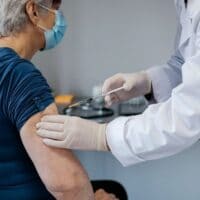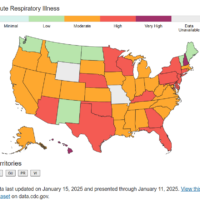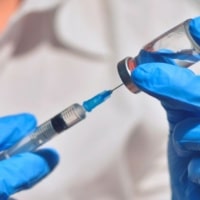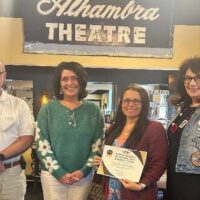Medicare-certified nursing homes in Kentucky will be allowed indoor visitation beginning Monday, March 15, Gov. Andy Beshear announced Thursday.
“This is great news for Kentucky and our so many families that have missed their loved ones,” he said at his last COVID-related news conference of the week. “The light at the end of the tunnel is getting brighter, but we have to continue to remain vigilant.”

In compliance with Centers for Medicare and Medicaid Servicesguidance issued Wednesday, Beshear said that with the exception of end-of-life situations, everyone entering the skilled-nursing facilities will be screened for COVID-19 upon entry and public-health precautions will remain in place.
Cabinet for Health and Family Services Inspector General Adam Mather encouraged potential visitors to get vaccinated, and said those who haven’t been will be required to have a negative test within 72 hours of the visit. Also, he said, anyone with a known exposure to the virus should not visit.
He said visitation should not be allowed when a visitor is unvaccinated and the county has a positivity rate of 10% or higher, or is in a “red zone” county, those averaging 25 or more cases per 100,000 people over the previous seven days, and less than 70% of the home’s residents are fully vaccinated; or if the resident is infected with the virus or is quarantined due to potential exposure.
Mather said close contact with a resident is allowed as long as the resident has been fully vaccinated and the visitor wears a mask and practices proper hand hygiene before and after contact.
“I’ve spoken to many family members,” he said, “and they just want to touch their loved ones’ hands.”
He also encouraged visitors to reach out to the facility prior to the visit to ensure that it can accommodate the visit.
Dr. Kevin Kavanagh, a retired Somerset physician who heads Health Watch USA, which focuses on infection control, objected to the new government guidelines.
He told Kentucky Health News that he had many concerns, including rules that allow visitation to continue as soon as one round of testing is completed and reveals no cases after a new case is identified. “That doesn’t work,” he said. “You’ve got a long incubation period and we saw that in the Rose Garden” event Sept. 26 for new Supreme Court Justice Amy Coney Barrett, which led to several COVID-19 cases.
Kavanagh also objected to the part of the federal guidance that will allow visitation in certain units of a home that have tested negative for the virus, while closing other units that still have active cases. Because the virus is aerosolized, he said, it can spread through the home’s ventilation system to other units.
“That’s kind of like smoking in the back of an airplane,” he said. “This thing’s aerosolized. That doesn’t work.”
He added, “These are our highest-risk individuals. … This virus is relentless, it does not care. And we cannot set up the elderly in an unsafe situation, especially when vaccines are available. If people want to visit the elderly, they should get vaccinated. … At a minimum, one of the two should be vaccinated, especially in times of high community spread.”
He expanded on his concerns in an op-ed for Infection Control Today titled, “Nursing Home Guidance Endangers Elderly.”
The state reported Thursday that there are 121 active cases among residents of long-term-care facilities and 136 among staff. It said on Feb. 1, more than 70% of residents and 45% of staff had been vaccinated as part of the federal program. The numbers did not reflect employees that may have been vaccinated elsewhere.
In mid-February, the state relaxed some visitation restrictions at assisted-living homes, personal-care homes, intermediate-care facilities for individuals with intellectual disabilities, and independent-living facilities whose residents are fully vaccinated.
Kentucky’s nursing homes will use a “smart entry screening platform” that will allow employees in the 285 Medicare-certified homes to enter them in a touchless manor with “smart badges.” Mather said the device has a touchless infrared thermometer attached to a tablet with screening questions.
Beshear said Kentucky will be the first and only state to provide these contactless screening devices designed to help reduce the spread of infection. CMS approved the Trilogy Foundation proposal to implement the program at a cost of nearly $6.8 million. The foundation’s website says it was established in 2018 to support families and communities affected by tragedy, disaster and poverty.
Mather said the federal vaccination program to vaccinate long-term care residents and staff had wrapped up, and that the state was now moving into a “maintenance program” along with independent pharmacies. When asked, Mather could not provide updated numbers on how many residents and staff had been vaccinated in the program, but said they were working on getting those numbers. “Anecdotally, we’ve seen similar numbers to the national numbers,” he said.
Melissa Patrick is a reporter for Kentucky Health News, an independent news service of the Institute for Rural Journalism and Community Issues, based in the School of Journalism and Media at the University of Kentucky, with support from the Foundation for a Healthy Kentucky. She has received several competitive fellowships, including the 2016-17 Nursing and Health Care Workforce Media Fellow of the Center for Health, Media & Policy, which allowed her to focus on and write about nursing workforce issues in Kentucky; and the year-long Association of Health Care Journalists 2017-18 Regional Health Journalism Program fellowship. She is a former registered nurse and holds degrees in journalism and community leadership and development from UK.






